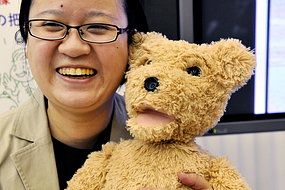Snoring robot teddy to give hugs to elderly

Japanese researchers have developed a cuddly teddy bear robot designed to comfort the elderly and delight children by reading facial expressions and actions and responding to them.
The fluffy invention by Fujitsu is still being worked on, but the electronics giant rolled out the as-yet-unnamed prototype for an early glimpse at an exhibition near Tokyo this week.
A camera in the nose of the bear can detect human faces and actions, such as waving of hands, while sensors inside its head and limbs can detect human touches and caresses.
The bear can respond with more than 300 actions of its own, from giggling and laughing to waving its paws and taking a nap - and even snoring.
During the sneak preview, a Fujitsu researcher said they want to offer an object that can be part of the family, nursing home or school and which could benefit all.
Fujitsu plans to test the robot in nursing homes so that it can entertain and soothe elderly people, said the researcher.
The teddy is not the first cuddly robot in Japan, where the high-tech baby seal Paro is already used in hospitals and nursing homes.
Paro coos and flaps its flippers to ease loneliness among the elderly and try to prevent depression and even dementia.
Japan has the world's longest average life expectancy - 79 years for men and 86 years for women, and more than a fifth of the population is aged 65 or older.
By 2050, that figure is expected to rise to 40 per cent.
Fujitsu said it may also use its robo-bear in schools to aid children to communicate, gain self-confidence - or to help them wake up in the morning.





















